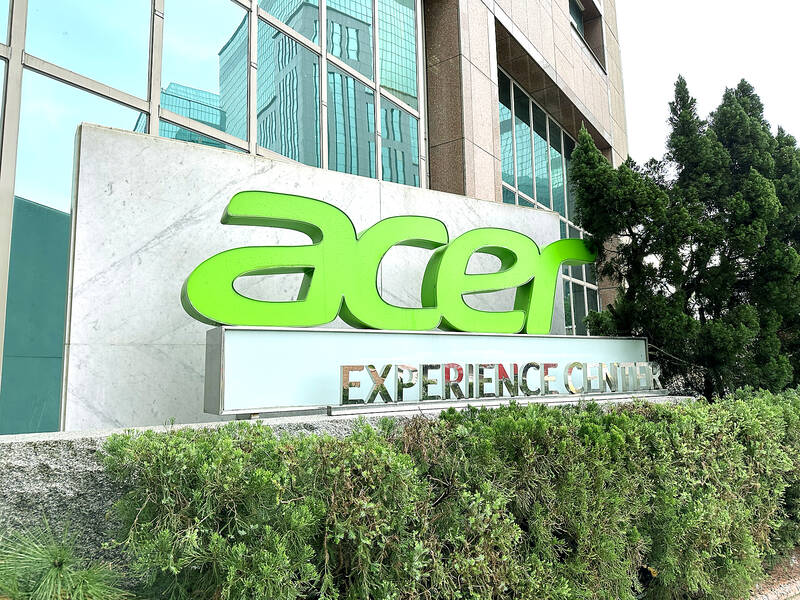PC vendor Acer Inc (宏碁) yesterday said it has swung back into profitability, with NT$515.17 million (US$16.8 million) in profit last quarter from a loss of NT$832 million in the previous quarter as a result of significant improvements in non-operating gains.
Acer booked NT$703.83 million in non-operating profit last quarter, reversing a non-operating loss of NT$1.48 billion in the fourth quarter last fiscal year due to volatility in foreign exchange rates, the company said in a statement.
Net profit annually plunged about 77 percent from NT$2.23 billion, it said.

Photo: Fang Wei-chieh, Taipei Times
Earnings per share dropped to NT$0.17, from NT$0.74 a year earlier. That was an improvement from losses of NT$0.27 per share in the fourth quarter of last year.
Gross margin dropped to 10.22 percent, from 10.58 percent in the previous quarter and 11.29 percent a year earlier, while operating margin weakened to 0.46 percent, down from 1.7 percent three months earlier and 3.7 percent a year earlier, the company said.
The company’s inventory, a closely monitored indicator by investors, reduced to NT$39.46 billion, from NT$42.21 billion at the end of last year, Acer said.
“Acer expects its business to have reached a low point in the first quarter, and the computer and displays business will begin to regain business momentum,” the statement said.
The global PC market plummeted 33 percent year-on-year to 54 million units during the first three months of this year, representing the fourth consecutive quarter of double-digit annual declines, market researcher Canalys said last month.
The research house expected PC demand to pick up in the second half of this year and gather further momentum next year.
Separately, Acer’s board of directors yesterday appointed Victor Chien (簡慧祥), chairman of subsidiary AOpen Inc (建碁), as corporate president.
Chien has worked at the company for more than 20 years, and he assumed the new role yesterday, Acer said.
Additionally, Acer cochief operating officer Tiffany Huang (黃資婷) said she would retire, and her corporate duties are to be assumed by Chien, the company said.
Huang’s role as president of China operations is to assumed by pan-Asia Pacific regional operations president Andrew Hou (侯知遠), the company said.
To ensure a smooth handover, Huang is become a corporate adviser to help Acer through the period of transition.

SEEKING CLARITY: Washington should not adopt measures that create uncertainties for ‘existing semiconductor investments,’ TSMC said referring to its US$165 billion in the US Taiwan Semiconductor Manufacturing Co (TSMC, 台積電) told the US that any future tariffs on Taiwanese semiconductors could reduce demand for chips and derail its pledge to increase its investment in Arizona. “New import restrictions could jeopardize current US leadership in the competitive technology industry and create uncertainties for many committed semiconductor capital projects in the US, including TSMC Arizona’s significant investment plan in Phoenix,” the chipmaker wrote in a letter to the US Department of Commerce. TSMC issued the warning in response to a solicitation for comments by the department on a possible tariff on semiconductor imports by US President Donald Trump’s

‘FAILED EXPORT CONTROLS’: Jensen Huang said that Washington should maximize the speed of AI diffusion, because not doing so would give competitors an advantage Nvidia Corp cofounder and chief executive officer Jensen Huang (黃仁勳) yesterday criticized the US government’s restrictions on exports of artificial intelligence (AI) chips to China, saying that the policy was a failure and would only spur China to accelerate AI development. The export controls gave China the spirit, motivation and government support to accelerate AI development, Huang told reporters at the Computex trade show in Taipei. The competition in China is already intense, given its strong software capabilities, extensive technology ecosystems and work efficiency, he said. “All in all, the export controls were a failure. The facts would suggest it,” he said. “The US

The government has launched a three-pronged strategy to attract local and international talent, aiming to position Taiwan as a new global hub following Nvidia Corp’s announcement that it has chosen Taipei as the site of its Taiwan headquarters. Nvidia cofounder and CEO Jensen Huang (黃仁勳) on Monday last week announced during his keynote speech at the Computex trade show in Taipei that the Nvidia Constellation, the company’s planned Taiwan headquarters, would be located in the Beitou-Shilin Technology Park (北投士林科技園區) in Taipei. Huang’s decision to establish a base in Taiwan is “primarily due to Taiwan’s talent pool and its strength in the semiconductor

French President Emmanuel Macron has expressed gratitude to Hon Hai Precision Industry Co (鴻海精密) for its plan to invest approximately 250 million euros (US$278 million) in a joint venture in France focused on the semiconductor and space industries. On his official X account on Tuesday, Macron thanked Hon Hai, also known globally as Foxconn Technology Group (富士康科技集團), for its investment projects announced at Choose France, a flagship economic summit held on Monday to attract foreign investment. In the post, Macron included a GIF displaying the national flag of the Republic of China (Taiwan), as he did for other foreign investors, including China-based